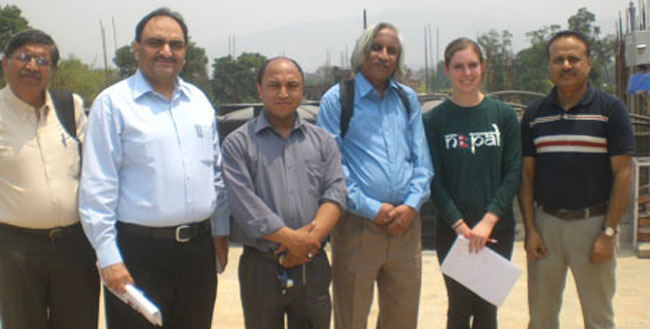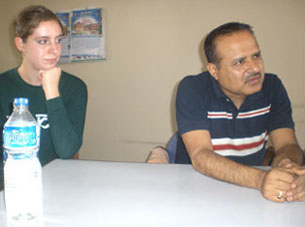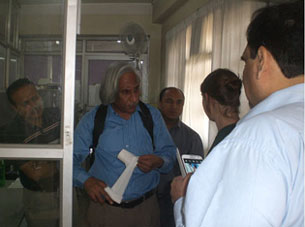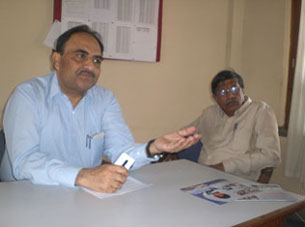at Siddhi Memorial Hospital-Bhaktapur

28 April 2014
Kathmandu/Bhaktapur, Nepal
Backround
Society for Legal and Environmental Analysis and Development Research (LEADERS Nepal), a NGO working in the field of legal and environmental issue since 1987. LEADERS Nepal is currently working on lead in paint issue with the support from QSP/UNEP. The major task of this project is to support Ministry of Environment, Government of Nepal to formulate standards for lead in paint and to support its commitment on GALEP (Global Alliance for Elimination of Lead in Paint). Lead is found in many products and it can harm children’s learning, growth, and hearing abilities. As a part of this project, LEADERS Nepal in partnership with Siddhi Memorial Hospital, Bhaktapur is conducting a research on relationship between blood lead levels (BLLs) and environmental exposures to lead among urban children in Bhaktpaur municipality. This study will help to understand how bad the problems are and what needs to be done to protect children from lead poisoning.This research also aims to test the children’s hemoglobin level so as to better understand its association with the blood lead level. The USA (Boston) based Lead Care company has provided a LeadCaree II machine on loan to conduct this research.
A team of scientists, Prof. Thuppil Venkatesh, Prof. Abbas Ali Mahdi and Prof. N. Shashidhara from InSLAR, India and Mr. Ram C. Sha, Executive Director of CHEPED visited the BLL testing facility on April 30th, 2014. At the center, reserch team observed the BLL testing activities and suggested varoius things to improve the study. Similalry, the visiting team also heartly thanked the members involved in BLL testing activities—first time being done in Nepal. The research team assured that they will support the BLL testing activities by providing BLL testing kits and other needed tools and accessesories to improve the study.
Objective of the visit :
The main objectives of the program were to observe the on going BLL testing activities; discuss issues associated with BLL testing with the Nepal reserch team at Siddhi Memorial Hospital; and to provide feed back on improvement of the study. Some of the main discussion topics included:
Identify the root causes of lead toxicity in Bhaktapur area.
Share Indian experience on mitigation measures of lead poisoning.
Establish and expand lead testing centres’ in Nepal.
Activities :
The visiting team showed interest on following issues:
Reasons to select Bhaktapur as BLL research center.
Discuss the consent forms and questionnaires being used in the study.
Future research plan to test lead in drinking water and indoor dust at homes.
Future collaborative activities with InSLAR.
Outcomes :
Visiting team was satisfied with the site selection criteria. Prof. Venkatesh opined that based on the available BLL test results, the root cause could be use of lead acid battery in children’s home.
Visiting team congratulated the research team (LEADERS & Siddhi Memorial Hospital) for designing an excellent consent from and questionnaires.
Visiting team decided to take 4 blood samples to test in two Indian labs, in Lucknow and Bangalore. Similarly 10 water samples from different sources will be tested in Bangalore lab.
InSLAR will support the BLL activities in Nepal and for that they will provide a box of BLL testing kit and a box of air filters to measure indoor levels of lead in children’s homes. In addition, they will also to help analyze the environmental samples from Nepal in their lab in the future.
Recommendations :
The visiting research team has provided following suggestions/ recommendations to improve the study:
If BLL is more than 25µg/dL in child then BBL should also be tested in one of the eldest family members in the house. Nepal research team could use the test kit provided by InSLAR for this testing.
Since LEADERS Nepal has some personal air samplers; measurement of indoor air lead levels is encouraged in some selected children’s houses. Nepal research team could use filters provided by InSLAR for this work. Filters will be analyzed at the InSLAR Lab. in India.
LEADERS should launch a campaign of using wet cloth under the lead acid battery or put lead acid battery in a separate box to minimize the lead exposure.
Similarly, a campaign of pasting neem leaf on the walls painted with lead-based paint should be launched to minimize to children the lead dust exposure to in homes.
Visiting team also suggested controlling dust in the testing lab.
Following people from LEADERS, Nepal and Siddhi Memorial Hospital were present at the meeting with the InSLAR visiting team:
Dr. Maju Ulak, Siddhi Memorial Hospital
Dhiraj Pokhrel, LEADERS Nepal
Camille Ezran, UC, Berkeley
Ajit Kawan, Siddhi Memorial Hospital




